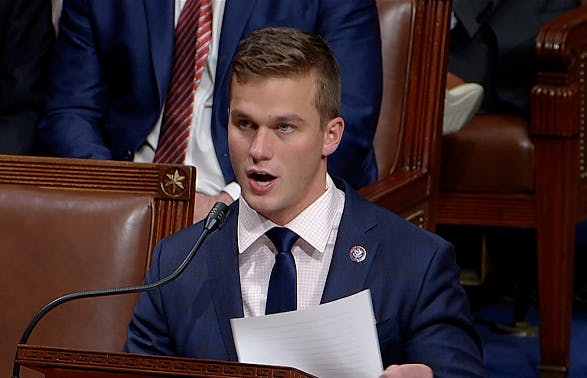Unsuccessful So Far, 14th Amendment-Based Electoral Challenges Spreading
Indiana’s decision will no doubt be followed closely in North Carolina, where Representative Madison Cawthorn is in the midst of what appears to be a much more serious challenge.

If the Hoosier State provides a preview, the push to disqualify candidates for office based on the 14th Amendment will be no sure bet.
Congressman James Banks, an Indiana Republican, survived one such challenge leveled by a Democratic opponent, Aaron “A.J.” Calkins. A bipartisan election panel unanimously rejected efforts to invoke the Disqualification Clause, which strikes from the ballot office holders who “engaged” in “insurrection” against America.
Even as this effort fell short, it illustrates the widening strategy of attempting to disqualify Republican candidates ahead of the 2022 midterm elections. Mr. Banks has called the effort to disqualify him “the same narrative” as those targeting President Trump and Representative Madison Cawthorn.
Mr. Banks was selected by the Senate majority leader, Mitch McConnell, to serve on the January 6 Congressional Select Committee but was blocked by Speaker Pelosi. He did not vote to certify the results of the 2020 presidential election.
Indiana’s decision will no doubt be followed closely in North Carolina, where Mr. Cawthorn is in the midst of what appears to be a much more serious challenge to his candidacy — one being mounted not by an opponent but by external groups on behalf of North Carolina voters.
The Tar Heel State’s Board of Elections has not yet rendered a final decision on whether Mr. Cawthorn can appear on the ballot. The panel has, however, defended its right to decide the question.
This stance has drawn opposition from Mr. Cawthorn’s attorneys, who have argued in federal court that the Constitution bars states from disqualifying candidates for federal office.
While the attempt to bar Mr. Banks shared a constitutional basis with the push against Mr. Cawthorne, their relationship to the events of January 6 are different enough to preclude Mr. Cawthorn from too confidently projecting his own electoral survival related to Mr. Banks’s victory.
While Mr. Banks voted to reject President Biden’s slate of electors from Arizona and Pennsylvania and added his signature to the Texas attorney general’s efforts to toss out the results of the 2020 election, even his opponents, concede that he had no involvement in the events of January 6. Mr. Cawthorn, on the other hand, spoke at the “Stop the Steal” rally that preceded the violence at the Capitol.
Additionally, the Hill reports that the group leading the legal challenge to Mr. Cawthorn claims to possess “reliable reporting that Cawthorn and his team were communicating with the planners ahead of Jan. 6 and helped to plan some of these events.”
While the case against Mr. Cawthorn has thus far been the Disqualification Clause headliner, the expansion of efforts to preclude from the ballot those with far more tangential links to January 6, such as Mr. Banks, suggest a wider effort just coming into the public ken.

